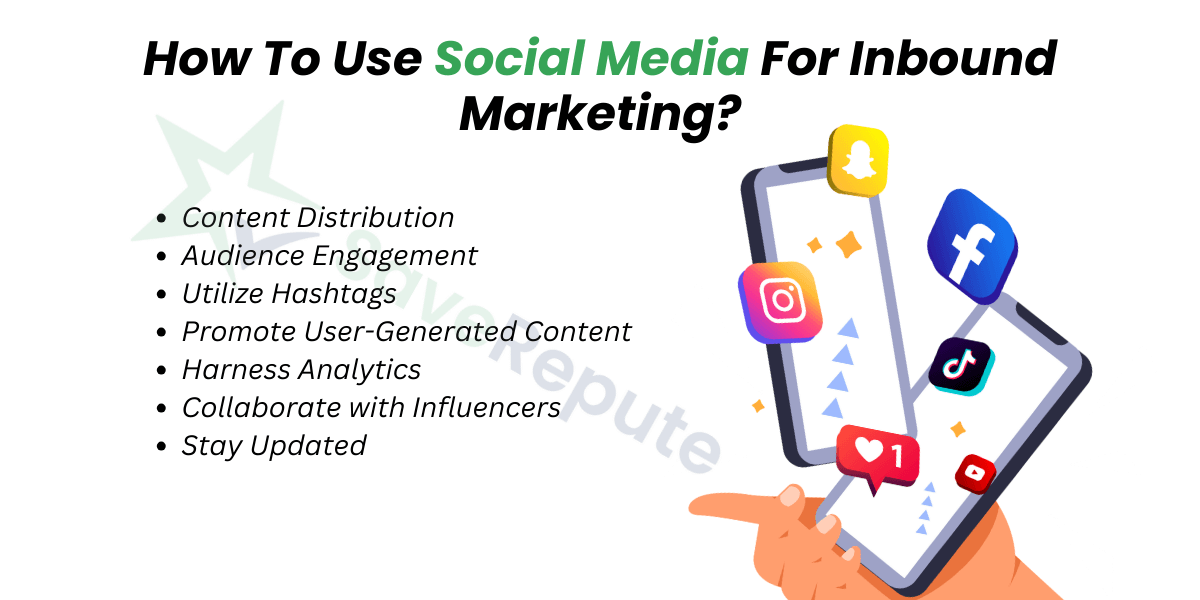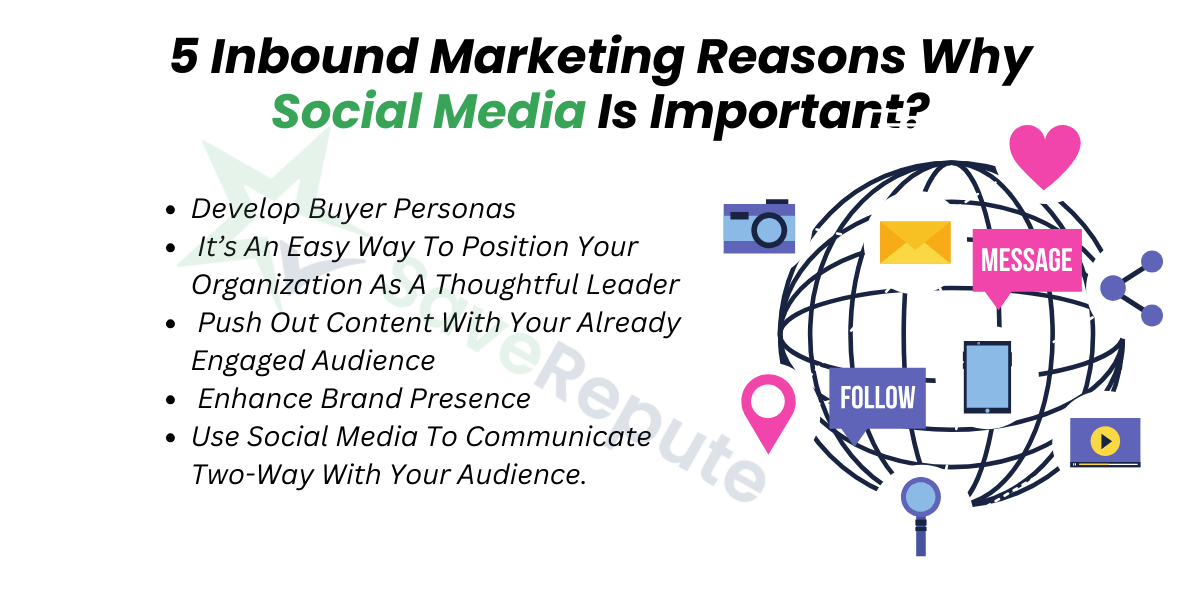Social media is a key component of inbound marketing because it plays a vital role in attracting and engaging potential customers. It allows businesses to share valuable content, build relationships, and drive traffic to their websites.
By leveraging social media platforms, businesses can increase brand visibility and reach a wider audience, ultimately leading to higher conversion rates and business growth. Let’s explore in-depth With Saverepute, why Is Social Media An Important Part Of Inbound Marketing.
What Is Inbound Marketing?
In essence, inbound marketing is about magnetism rather than aggressive pursuit. It’s about crafting content that draws in potential customers, offering them value rather than intruding on their space. With a variety of inbound marketing examples such as eBooks, podcasts, and webinars, it’s a strategy that hinges on genuine attraction rather than disruptive advertising.
For instance:
The term inbound marketing can be found throughout a variety of content marketing practices. The content can include blogs, webinars, infographics, and newsletters created by the brand. This includes external coverage of your products or brands in other publications or websites, too. Within social media, there’s also brand-inspired hashtags and UGC. In short, any type of content that mentions or shows your brand or product can help to raise brand awareness and help advertise for you.
Is Social Media Part Of Inbound Marketing?
Yes, and in a big way. In the vast expanse of the digital realm, social media platforms are the bustling hubs. They’re where conversations happen, opinions form, and most importantly, where content gets discovered. It generates brand awareness, brings in customers, generates sales, and boosts brand loyalty. This makes social media marketing a vital artery in the circulatory system of inbound methodologies.
What Is The Relationship Between Social Media And Inbound Marketing?
Social media breathes life into the core ideals of inbound marketing. While inbound focuses on drawing customers in, social media include channels where these potential customers actively engage, share, and consume content. Social media acts as the loudspeaker, amplifying its reach.
Unlike traditional marketing channels where brands dominate the conversation, social media encourages a two-way dialogue. It’s the modern agora where businesses don’t just speak; they listen. As platforms such as Instagram and LinkedIn evolve, they offer an unparalleled opportunity for brands to humanize their approach, foster community, and genuinely connect.
How To Use Social Media For Inbound Marketing?
To use social media for inbound marketing, use these methods to imply higher results for either your professional or Hyper local businesses.
Content Distribution: Your content is a valuable asset for you. Distribute your cornerstone content across various social media platforms with proper hashtags and captions. You can share your content in the form of blog posts, videos, images and other content variations.
Audience Engagement: Your engagement with your audience is a vital source of success and growth. As it shows, you care about your audience which builds trust among your brand and loyal customers. Make sure to respond to comments, host live sessions, and encourage conversations. Encourage discussions, polls, and user-generated content.
Utilize Hashtags: Hashtags are very trendy in any social media content or post. Research and use hashtags that are relevant to your content to increase your maximum reach, and audience. Without hashtags, you can’t progress in the right way.
Promote User-Generated Content: Ask your followers to share their experience with your brand or products. You can also repost UGC content which not only provides you with fresh information but also boosts credibility.
Harness Analytics: Regularly check your posts analytics to get an idea of how your posts are being linked with your audience. It provides an understanding of the social media strategy you implement, either right or wrong.
Collaborate with Influencers: Partner with social media personalities who align with your brand. Their endorsement can introduce your content to a broader audience and provide a fresh perspective.
Stay Updated: Social media trends evolve rapidly. Ensure you’re aware of the latest features and best practices to maintain an edge in your inbound strategy.
Each platform has its own nuances. For instance, while Instagram might be perfect for visually rich industries, LinkedIn caters to a more professional crowd. Choose your platforms wisely based on where your audience hangs out.
5 Inbound Marketing Reasons Why Social Media Is Important?
Think of inbound as the heart of your digital strategy, and social media as the veins distributing life-giving oxygen (content) to every part. Social media enhances inbound by ensuring content reaches the right eyes and ears. It provides real-time feedback, enabling brands to refine their approach. In today’s digital age, how social media helps in business isn’t just through promotion; it’s through fostering genuine relationships and building trust. Here are most important 5 reasons to know the importance of inbound marketing in social media:
1. Develop Buyer Personas
Developing buyer personas is a crucial part of buyer personas. Throughout this process, you can develop an understanding of where your personas are being used most. Social media research required in this process, to know about the outlet an organization should be present on.
2. It’s An Easy Way To Position Your Organization As A Thoughtful Leader
Most clients look for the best organization to start work with them. So make sure your profile describes you in the best possible way. Sharing your business knowledge publicly on social media is a simple method to establish oneself as a thought leader in the field. You ought to be publishing content about it and inviting comments from your audience, whether it’s a trending subject in your sector or a persistent problem your business helps with.
3. Push Out Content With Your Already Engaged Audience
Social media is a great avenue to push out your content with the right audience engaged with your profile already. You should share recently published blog posts, checklists, case studies, e-book on social media so that your audience is aware about your recent content update on the website.
4. Enhance Brand Presence
You can easily enhance your online brand presence on social media by adopting the right strategy that’s fruitful for your business. Just make sure that to resonate, create a consistent identity on different platforms, focusing on content relevant to your target audience, and engage meaningfully with followers. Ensure to establish a clear tone, visual style, and interaction strategy from the start.
5. Use Social Media To Communicate Two-Way With Your Audience.
Although, communicating with your audience in public forums is scary, it helps strengthen confidence. Whether you’re handling negative reviews or giving answers to the customer support help, responding on time shows that you care about your audience. This will strengthen your position in the market.
Best Practices For Social Media Inbound Marketing
If you want to execute social media inbound marketing, you can follow these best practices to power up your brand visibility:
- Ensure your profiles reflect your brand’s voice and aesthetics.
- Choose your brand audience wisely, as not all platforms serve the same audience.
- Humanize your brand. Listen, respond, and be genuine.
- Trends evolve. Adapt your strategy with changing audience preferences.
- Leverage your data; Use analytics to guide your content choices and posting schedules.
Final Thoughts
Blending social media with inbound marketing isn’t just a trend—it’s the future of digital marketing. As the lines between social media marketing and inbound marketing platform usage blur, it’s crucial for businesses to harness this combined potential. Whether you’re brainstorming the best name for a social media managementagency or trying out new content types, always place authentic engagement at the forefront. The era of monologues is over; it’s time for meaningful conversations.




